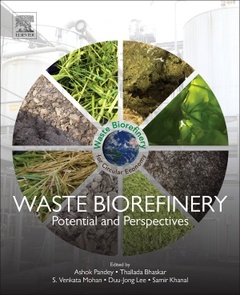Waste Biorefinery Potential and Perspectives

Waste Biorefinery: Potential and Perspectives offers data-based information on the most cutting-edge processes for the utilisation of biogenic waste to produce biofuels, energy products, and biochemicals ? a critical aspect of biorefinery. The book explores recent developments in biochemical and thermo-chemical methods of conversion and the potential generated by different kinds of biomass in more decentralized biorefineries. Additionally, the book discusses the move from 200 years of raw fossil materials to renewable resources and how this shift is accompanied by fundamental changes in industrial manufacturing technologies (from chemistry to biochemistry) and in logistics and manufacturing concepts (from petrochemical refineries to biorefineries).
Waste Biorefinery: Potential and Perspectives designs concepts that enable modern biorefineries to utilize all types of biogenic wastes, and to integrate processes that convert byproduct streams to high-value products, achieving higher cost benefits. This book is an essential resource for researchers and students studying biomass, biorefineries, and biofuels/products/processes, as well as chemists, biochemical/chemical engineers, microbiologists, and biotechnologists working in industries and government agencies.
I. Feedstocks for Biorefineries1. Waste Feedstocks for Biofefineries: An Approach to Develop a Sustainable Society2. Kinetic Analysis of Biomass Pyrolysis3. Side-streams from bioenergy and biorefinery complexes as a resource for circular bio-economy
II. Conversion Processes4. Thermochemical Conversion in Biorefineries5. Combined Thermochemical-Biochemical Routes in Waste Biorefinery
III. Food Waste Biorefinery6. Acidogenic Valorization of Food Waste to Biogas and Platform Chemicals7. Food Supply Chain Waste: A Functional Periodic Table of Biobased Resources
IV. Municipal Solid Waste Biorefinery8. Conversion of Solid Waste to Fuels and Chemicals through Pyrolysis
V. Lignocellulosic Biorefinery9. Lignocellulosic Biorefinery Wastes - Or Resources10. Hydrothermal Processing of Wet Forest Residues and Agricultural Wastes for Production of Biofuels and Chemicals11. Pyrolysis of Lignocellulosic Biomass for the Production of Renewable Chemicals12. Co-pyrolysis of Agro Residues with Waste Plastics for Resource and Energy Recovery13. Microwave-driven Biorefinery for Utilization of Food and Agricultural Waste Biomass14. Lignin Conversion: A Key to the Concept of Lignocellulosic Biomass-based Integrated Biorefinery15. Synthesis of Bioethanol from Invasive Weeds: Process Design, Optimization, and Intensification with Ultrasound16. Valorization of Wastes from Agro-food and Forest Industries within the Biorefinery Concept: South Europe Scenario17. Ionic Liquid Stable cellulases and Hemicellulases: Application in Biobased Production of Biofuels
VI. Water-based Biorefinery18. Resource Recovery from Wastes and Wastewaters using Bioelectrochemical Systems19. Exploitation of Microalgae-based Biorefinery - Opportunities and Challenges
VII. Specific Biorefinery20. Waste Biorefinery in Arid Regions21. Potential and Perspectives of Biorefinery from Castor Seed22. Insect-based biorefinery for bioenergy and biobased products: A critical review23. Thermochemical Valorization of Paper Deinking Residue through Microwave-assisted Pyrolysis
VIII. Associated Studies24. Process Integration and Design Philosophy for Competitive Waste Biorefineries25. Process Control and Monitoring in Biorefineries26. Environmental Impacts of Utilizing Woody Biomass for Energy
Chemists, Chemical Engineers, Biochemical Engineers, Microbiologists, Biotechnologists working in academic institutes, research institutes, industries and governmental agencies. MS/M Tech students; Ph D scholars; researchers studying biomass conversion, biofuels, biorefineries, bioprocesses and bioproducts, bio-chemicals etc
His 20 years of research experience cover various fields of science revolving around his expertise in heterogeneous catalysis thermo-chemical conversion of biomass, waste plastics and e-waste plastics into value added hydrocarbons. He has prepared several catalysts and thrown a light on the structure activity relationships of novel catalytic materials for hydrotreatment of fossil based crudes. His contributions to the field of sustainable hydrocarbons are in the form of process knowhow and catalyst developments. His patents and publications discuss crucial points encompassing wide areas of thermo-catalytic conversion like pyrolysis and hydrothermal liquefaction for biomass (agricultural, forest residues and aquatic biomass) and plastic waste (industrial and e-waste) conversion. In addition he worked on developing micro-channel reactors for several chemical reactions and separation processes. His other interests include utilization of non-conventional energies for the sustainable production of hydrocarbons utilizing the polymeric wastes available which will make the thermo-chemical methods of conversion more energy efficient.
In view of his expertise, he is on the edito
- Details the most advanced and innovative methods for biomass conversion
- Covers biochemical and thermo-chemical processes as well as product development
- Discusses the integration of technologies to produce bio-fuels, energy products, and biochemicals
- Illustrates specific applications in numerous case studies for reference and teaching purposes
Date de parution : 04-2018
Ouvrage de 890 p.
19x23.3 cm



